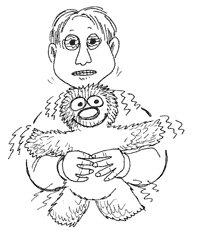Eye vibe: Stretch the pics by humming

DRAWING BY DEBORAH DERR McCLINTOCK
Q. Why when you hold a vibrating "Tickle Me Ernie" doll under your chin with teeth clenched, then look at a TV or computer screen, does the picture waver? –G. Bush
A. No Ernie handy? Try a low, gravelly humming or munching on crunchy chips, suggests Harvard vision scientist Patrick Cavanagh. Anything to get your head (really your eyeballs and retinas) vibrating at a certain frequency while you watch the screen, best from a distance.
As you peer at it, the picture is repainted top to bottom 60 times every second (50 in Europe), too fast to see, but the images are actually flickering up, up across your retinas. As your retinas are vibrated upward, they go in the direction of the screen's image scan, "stretching out" the picture; vibrating downward, they go against the grain of the scan, "compressing" the picture.
So you wind up seeing wavering horizontal bands, which can be made to do even weirder things as you vary your vibration frequency and eye-to-screen distance.
Q. What is it about flipping a coin that makes it a 50-50 proposition for getting either heads or tails? And isn't this why the coin toss has become a central symbol of a fair chance in games or sports events? –J. Unitas
A. Surprise! A coin toss isn't "fair" at all. It took some deep digging by Stanford statistician– and former magician– Persi Diaconis, but after working with other mathematicians (including his wife) and technicians who constructed a mechanical-coin-tosser, Diaconis uncovered that a coin will come up heads 51 percent of the time if the heads starts out on top, and vice versa.
So, if there's such a strong bias, why hadn't anybody ever discovered this before? Because you'd have to flip coins about 10,000 times– and record the data very carefully– to achieve statistical significance and become relatively certain of the finding.
Magician Diaconis is himself capable of flipping coins and getting them to come up either heads or tails 10 out of 10 times. Here he is careful to make the coin appear to turn over many times, but it really doesn't. The fact is, says Diaconis, that even when the coin is flipped with the intent of unloosing a "fair" toss, this is not humanly possible. Bias is going to creep in, and out the window inevitably will go 50-50.
Q. Would you say a bird flies more with its wings or its feathers? Isn't there a clue to be found in the ancient Greek myth of Icarus, who flew too close to the sun and plunged to his death in the sea? –W.H. Auden
A. You might think a bird flaps its wings backward on the downstroke, pushing on the air to gain forward thrust, says Jearl Walker in The Flying Circus of Physics, with Answers. But slow motion movies show the wings moving forward as well as downward on the downstroke. Recall that flying Icarus fell when the heat of the sun melted the wax that held feathers to his arms. The myth got it right, in that a bird's feathers twist in the air and act a little like propellers. So feathers are indeed critical right along with wings, that act as airfoils. "Perhaps a plucked bird could soar, but it could not propel itself," Walker says.
Q. We humans are such social beings that it's an enormous benefit at times to know what's on each other's minds. So how do we do this? –C. T. Magnificent
A. We're practiced mind-readers of sorts, assuming that what we're thinking in a certain situation is likely to be what other people are thinking. Then we test this out to see if we're correct, says University of Texas psychologist William Ickes in Everyday Mind Reading. Reading facial expressions, tones of voice, body language... all go by the feedback loop of observing, testing, observing again. Some people are naturally good at this, others need to work at it. "Salesmen, negotiators and therapists, take note! Even just an hour of practice can help."
Women tend to be better at this than men because they're more motivated. For the same reason, newly married couples know each other's minds better than "old" marrieds, since newlyweds look and listen more carefully.
Doesn't take telepathy or ESP to be good at this, but something Ickes calls empathic intuition, based on our shared lives and similarity of reactions to things. Also helping us are "mirror neurons," special nerve cells that fire both when we do something and when we merely observe another person doing the same thing. In this lucky physiological sense, we're all wired to be mentally simpatico.
Send Strange questions to brothers Bill and Rich at .
#